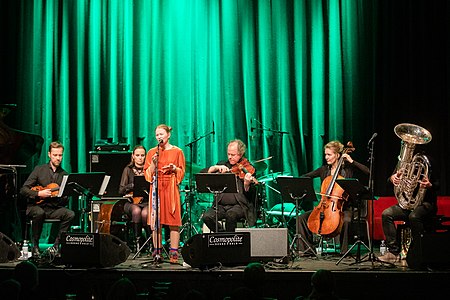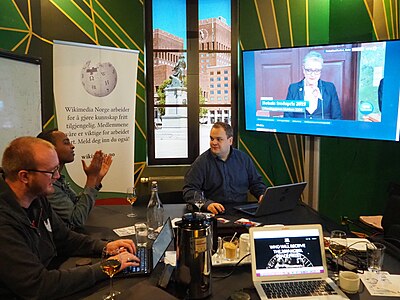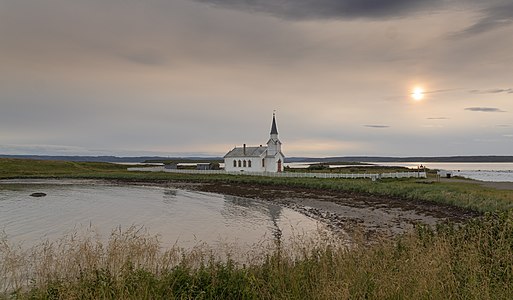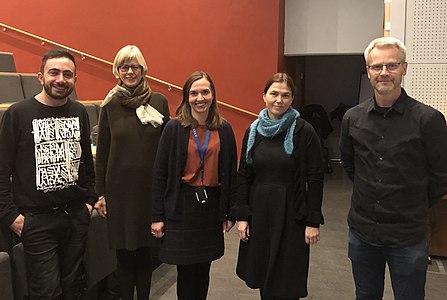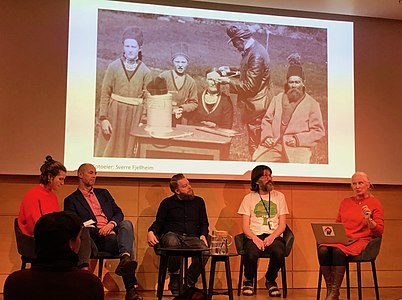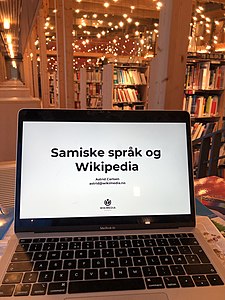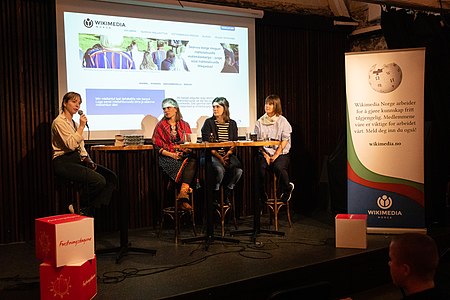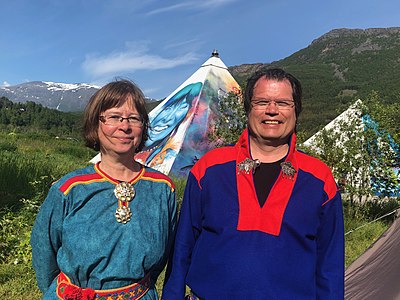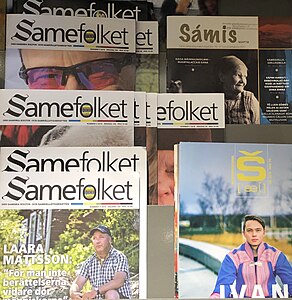Grants:APG/Proposals/2018-2019 round 2/Wikimedia Norge/Progress report form
Purpose of the report
editThis form is for organizations receiving Annual Plan Grants to report on their progress after completing the first 6 months of their grants. The time period covered in this form will be the first 6 months of each grant (e.g. 1 January - 30 June of the current year). This form includes four sections, addressing grant metrics, program stories, financial information, and compliance. Please contact APG/FDC staff if you have questions about this form, or concerns submitting it by the deadline. After submitting the form, organizations will also meet with APG staff to discuss their progress.
Overall progress
editIn this report Wikimedia Norge (WMNO) will report on our progress for the first 6 months of the funding period July 2019–June 2020.
We are on track with reaching our targets for the global and grantee defined metrics. For one target, Content for the grantee defined metric Diversity, we have probably sat the target too low for the whole year period. We have so far spent 48 % of our total budget and don’t expect any expenses that are not budgeted for. In 2019 WMNO was in total awarded 800,000 NOK/93,576 $ In the 2018–2019 Impact Report we wrote that Wikimedia Norge is aiming at 30 % of total budget being external funding, and we have now reached that goal. However, as 2019 was designated by UNESCO as the International Year of Indigenous Languages ("IYIL"), and WMNO was recognized by UNESCO as a Civil Society Partner for the campaign it gave us more funding opportunities then we can expect for 2020. However, we hope to keep the momentum going and WMNO is also considering the potential for fundraising which so far is unexplored.
On February 2, 2020, WMNO are applying for a conference grant from the Wikimedia Foundation for a Wikimedia Diversity Conference Europe together with a conference team of volunteers, representation of all Nordic countries and several members from the Working Group Diversity in the strategy process. WMNO has a lot of experience from our work on emphasising on gender diversity that extends from the board leadership level, through to program design and implementation and on language diversity from the Sámi project. But with the implementation of the strategic recommendations there are different issues we would like to address together with fellow Wikimedians, Wikipedians as well as partner institutions and organizations. Like what cultural and organizational changes are needed within the Wikimedia movement, how do we improve the user experience, work with underrepresented groups when we are part of the majority and protection and safety? If the grant is approved, the planning of the conference will affect how we prioritize our work in May and June. We would of course as much as possible like to involve partner institutions and organizations that work with the topics of diversity and equality and this planning needs to start before the summer holidays start in Norway in June/July.
Diversity is the overarching theme for all three programs WMNO have:
- Program 1 Supporting communities
- Program 2 Closing content gaps
- Program 3 Raising awareness of free, trusted knowledge
In our impact report for the 2017–2018 funding period we wrote:
Our work over the next two years: We feel like we're hitting our stride with our current direction, both with community support and involvement and partnerships, and are establishing ourselves as a go-to organization for communities in Norway who want to share information from underrepresented groups. As an organization we have developed a credibility both internally in the local Wikimedia communities and externally to other organizations. We do need to diversify our funding and over the last year we have started doing more advocacy work to get to know organizations that award funding. For the Sámi project this means for example requesting to take part at committee meetings at the Sámi parliament held twice a year. Wikimedia Norge took part at the September 2018 meetings in Karašjohka (Karasjok), the city in northern Norway where the Sámi parliament is located. In-kind donations have increased significantly in the last year, and over the next years we will consider if it can be increased further.
We are pleased to report that the progress we listed about two years ago has been achieved. Below we will share more details from each program and some highlights that we hope illustrates how WMNO works with volunteers and partners.
Evaluation of Wikikmedia Norge's work:
Every quarter, before board meeetings, staff from WMNO shares reports on wiki on our activities, spendings and communication work. This gives volunteers, members and the Wikikmedia Norge board and committees the oppourtunity to follow and oversee over work, and it's important for us to be transparent on how our resources are spent.
Guidelines for Wikimedia Norges's work:
WMNO has several guidelines for our work and the responsibility of updating them yearly, or when needed, is divided between the different board members according the what background and expertise the board members have. In the last 6 months the vice chair and a WMNO staff member have worked on drafting a guideline for environmental sustainability. It has not yet been approved by the board (it is on the agenda for the next board meeting February 11), and it's only in Norwegian.
Metrics and results overview - all programs
editWe are on track for the metrics we have set as targets for 2019–2020. The metric for Diversity will most likely be quite a bit higher than what we set as target for this year due to a collaboration with The Norwegian Mapping Authority on adding Sámi place names (place names in the indigenous languages Northern Sámi, Southern Sámi, Lule Sámi and Skolt Sámi) to Wikidata.
Explanation of grantee defined metrics:
- Diversity: Number of new or improved articles on women's biographies on the Norwegian Bokmål, Norwegian Nynorsk or Northern Sámi Wikipedias and number of Sámi-related items added to Wikidata. Starting with this progress report we are also including images upladed to Wikimedia Commons and pages added to Wikisource during as part of our two projects on Sámi knowledge and Women in Red.
- Community hours: Hours community members spend on organizing activities or helping staff organize activities (not included are hours spend adding content)
| Participants | Newly registered | Content pages | Diversity | Volunteer hours | |
|---|---|---|---|---|---|
| Program 1 Community Support | Target this year: 500 Progress Q2: 7,255 (this includes the reach of WikiTongues video) |
Target this year: 50 Progress end Q2: 31 |
Target this year: 10,000 Progress end Q2: 16,250 |
Target this year: 5,000 Progress end Q2: 3,750 |
Target this year: 600 Progress end Q2: 320 |
| Program 2 Content | Target this year: 500 Progress end Q2: 225 |
Target this year: 200 Progress end Q2: 70 |
Target this year: 10,000 Progress end Q2: 2,800 |
Target this year: 10,000 Progress end Q2: 3,390 |
Target this year: 500 Progress end Q2: 330 |
| Program 3 Free Knowledge | Target this year: 400 Progress end Q2: 60 |
Target this year: 20 Progress end Q2: 5 |
Target this year: 2,000 Progress end Q2: 100 |
Target this year: 100 Progress end Q2: 20 | |
| TOTAL FOR ALL PROGRAMMES | Target this year: 1,400 Progress end Q2: 7,570 |
Target this year: 270 Progress end Q2: 106 |
Target this year: 20,000 Progress end Q2: 19,050 |
Target this year: 17,000 Progress end Q2: 7,240 |
Target this year: 1,200 Progress end Q2: 670 |
Comments on metrics:
We very much welcomed the grantee defined metrics when they were introduced for the 2016–2017 funding period. Both metrics Wikimedia Norge decided on, diversity and community hours, have increased over the past three years. The development for the grantee defined metric Diversity for the period July–December is:
- July–December 2017: 400
- July–December 2018: 5,530
- July–December 2019: 7,240
We expect a continued increase for the Diversity metric, as much of our work and collaborations will be on Wikidata and Wikimedia Commons the next years. We would like to add that in the work for knowledge equity, a high number alone is not necessarily a sign of a successful project or collaboration. The transcription and translation of 30 letters from Norwegian to English to Armenian documenting the Armenian genocide by a Norwegian nurse and missionary, Bodil Biørn (project page), is an example of a year-long project, making unique archive material written by a women available on Wikisource. The project has also received national funding.
Telling your program stories - all programs
editWikimedia Norge has three programs for the upcoming funding period. All three program have been part of our work for several years and have a strong focus on a selected group of partnerships and a set of activities and events we do on an annual basis. The fact that some activities and events are annual helps us plan our work ahead and do it in an efficent way. It also means that both volunteers and partners know that for example each October we do a Wikinobel event at The Nobel Peace Center and they can reach out to us and plan their own engagemnet.
Supporting Communities
This program will strength and support the work done by and the collaborations between a diversity of communities, partner organizations and Wikimedia Norge
-
Concert image uploaded to Wikimedia Commons by volunteer
-
Wikipedians and Wikimedia Norge staff at The Nobel Peace Centre during Wikinobel 2019
-
Image that was part of Wiki Loves Monuments 2019
Status
editThe goals we are working on to achieve for the 2019–2020 funding period are:
- WMNO will be an organization that works together with a diverse set of communities and is considered an influential organization in free culture and open knowledge.
- WMNO will offer different types of support to new and active volunteers that enables contributions to the Wikimedia projects.
- WMNO will support different community initiatives and share volunteers' stories in social media.
Our communication plan is an important tool for us to reach our goal of becoming an influential organization in free culture and open knowledge. The different communication channels we use are: Our website, wiki, blog, newsletters, Facebook, Instagram, YouTube and Twitter.
We have a set of community support activities that we have organized over several years now. The community support activities are used and appreciated by both Wikimedia Norge members and other volunteers. Examples of different activities Wikimedia Norge offer to support community activities are wiki grants, The Wikipedia Library, online editing and photo contests like Wiki Loves Monuments, wiki meet-ups and Wikidata workshops, applying for press accreditations, sharing stories from volunteers and our work in different communication channels. As we increase the number of volunteers we give support in one way or the other, we have more volunteers we can encourage to get engaged in other projects as well.
Progress
editWe are on track with this program, and the achieved metric for content pages is higher than what we set as target in our proposal; Target this year: 10,000/ Progress end Q2: 16,250. The metric Content Pages are for the most part the sum of new and improved articles in the monthly editing contest and edits done as part of our The Wikipedia Library project. The monthly editing contest have generated almost 5 times as many new or improved articles as compared to last year. This monthly editing contest is some months entirely community initiated and led, some months we sponsor prizes, and some months we initiate and organize the contest as well.
Over the last year we have managed to make more connections between programs 1 and 2, or between volunteers and partner institutions. An example is a Women in Red editing contest on Wikipedia, initiated and led by a volunteer, but the same month as students from Oslo Metropolitan University were working on the red lists for their university elective. So the students and the volunteers ended up helping each other out in editing. We strongly believe the rather large resources in staff time we put into our information work results in more connections like these. We have also rewritten and translated our homepage Wikimedia.no to make sure it explains our work in a way that hopefully is easy understandable for both Wikipedians and potential professional partner institutions.
The 2030 strategic direction reads: By 2030, Wikimedia will become the essential infrastructure of the ecosystem of free knowledge, and anyone who shares our vision will be able to join us. In our Norwegian context we see some examples of how we are moving in a direction of being a part of the of the ecosystem of free knowledge, but also a need for rethinking how we address and communicate with volunteers and partner institutions while moving in this direction. One example: In November 2019 we did and event with The National Archive to mark the end of our 2 year long Bodil Biørn project (link to Wikimedia Foundation blog post about the project). A researcher from Oslo Metropolitan university attended the event. She was working on a a peer reviewed article about recorded human rights violations in archive material and the possible challenges in digitalizing such material. She had used the Bodil Biørn project as an example in the article. She had stumbled upon the Bodil Biørn project page on Wikipedia and read about our work. This project page was written so that WMNO staff and volunteers could keep track of the project’s progress, but not with an “outside” reader in mind. If we are to become the essential infrastructure of the ecosystem of free knowledge, we need to have those new and "outside" readers and contributors and partners in mind. We have rewritten our project pages with this in mind after this happend. They can be read here.
Highlights
- From weekly to monthly Wikipedia editing contests: From 2009 until the start of 2019, we have had recurring weekly contests in the Norwegian and Northern Sámi Wikipedias. At the start of 2019, the community decided to reduce the frequency of the contests from weekly contests to monthly ones. Several reasons were given, but they can probably best be summed up as "contest fatigue": less contributors participating week over week led to lower impetus for organizers to organize interesting contests, leading to fewer participants, and so on. While it has only been one year so far with monthly contests intsead of weekly ones, the refactoring seems to have been a success so far: In the 6 months from July to December there were 51 unique contestants creating 5,006 new articles in 2019, compared to 36 contestants and 951 new articles for the same period in 2018. Wikimedia Norge continue to support organizers who request prizes or other assistance for their contests, as well as organizing some contests ourselves. In 2019 we organized two of the monthly contests, one about Wiki Loves Monuments and one about Sámi topics.
- Language space in Wikimania 2019: Jon Harald from Wikimedia Norge was the initiator of and one of the space leaders for the "language space" at Wikimania, in cooperation with people from several other affiliates. This entailed soliciting and curating submissions for the track, as well as taking notes from and moderating the sessions themselves. Also at Wikimania, we took part in the revitalization of the Wikimedia Language Diversity network of people working on small and indigenous languages across the Wikimedia projects.
- Norwegian "wikifika": We have observed that the Swedish community has had a lot of success with their "wikifika" meet-ups, where people meet at regular intervals at the same place at the same time, and want to try the same in Norway. The regular meet-ups we have had for the last several years have had quite an administrative overhead in that we have had invited speakers and catering, so we want to try to "tone it down" a bit and instead increase the frequency. So until at least the summer of 2020, we will hold regular meetups on the last Wednesday every month in the same place, with no set agenda other than meeting and chatting about Wikimedia issues. This will take part in Oslo, but we are hoping people elsewhere in the country will be inspired to do the same.
Mewasul found the workshop about Pattypan – a way to mass upload images with metadata to Wikimedia Commons particularly useful, and in the open space she got help to set up a significantly better workflow for working on categories on Wikipedia. In addition, she helped Yupik merge data from various Excel sheets in various languages into a single spreadsheet. This information will be used later on to autogenerate descriptions in Northern Sámi, and eventually Inari and Skolt Sámi, in Wikidata.
— Users Mewasul and Yupik in blog post for wikimedia.no about their participation at the Wiki Techstorm 2019 in Amsterdam, supported by funding from NUUG Foundation to Wikimedia Norge
Closing Content Gaps
This program will add high quality content to close content gaps on the Wikimedia projects by partnerships between Wikimedia Norge, volunteers and major Norwegian institutions
-
Participants in the Bodil Biørn project at an event hosted by Wikimedia Norge and the The National Archive. We were happy we had the chance to invite David Saroyan from Armenia to present at the event.
-
Wikimedia Norge hosting a International Year of Indigenous Languages event at The National Library with participants from The National Libray, The National Archive, UiT The Arctic University of Norway and The Norwegain Museum of Cultural History.
-
Wikimedia Norge visting the Sámi Parliament to take part in two plenary sessions.
Status
editThe goals we are working on to achieve for the 2019–2020 funding period are:
- WMNO will explore existing national and international partnerships to diversify the content available on the Wikimedia projects.
- WMNO will support initiatives and contest that results in high quality images uploaded to Wikimedia Commons with image use across many Wikipedias.
- Through partnerships with GLAM and education institutions WMNO will give access to and contribute to free knowledge.
The three main projects in this program include partnerships we have worked on for several a years already and they are all supported with natioanl funding. The 3 main projects are:
The Sámi project is the most comprehensive of the projects and will continue to be so the rest of this funding period. The second year of the Bodil Biørn project is just finished, with excellent help from volunteers in Armenia. WMNO are looking into ways of continuing the Bodil Biørn project with volunteers in Armenia by finding ways of making the images and letters that have been shared on Wikimedia projects known to the public. We're building on the experience from the Bodil Biørn project in a possible new project with the National Archive on images and diaries related to Sámi history. The Women in Red project as well as Art+Feminism are getting well known among Norwegian art institutions and WMNO helps out with relevant red lists and Wikipedia editing trainings. Our Women in Red collaboration with Oslo Metropolitan University will continue autumn 2020 with some small changes based on the students' feedback to us and our partner in this project, The National Library.
Progress
editThis is Wikimedia Norge's most comprehensive program when it comes to staff involvement and we are on track with its progress. Building partnerships with GLAM and educational institutions is work that in a Norwegian context requires staff involvement. Relying on volunteer engagement alone would not work in for example in negotiations, applying for funding and hosting events. The national funding we have been awarded in 2019 is project funding for GLAM projects about diversity themes such as gender gap on Wikipedia and sharing Sámi knowledge on the Wikimedia projects. The International Year of Indigenous Languages 2019 gave us more funding opportunities than previous years and the chance to expand ongoing projects. To do so we have worked with more volunteers and also students on short-term contracts. These students can be a great pipeline also for later volunteer or professional engagement in Wikimedia Norge's work.
In this program we work with partner institutions on Wikidata uploads, Wikimedia Commons uploads, adding documents to Wikisource, writing of Wikipedia articles by students (as an elective at Oslo Metropolitan University), organizing events and taking part at conferences, and outreach activities such as monthly online Wikipedia writing competitions for volunteers. We're very happy to see volunteers taking the initiative to do a month-long Women in Red contest with 588 new articles and even more articles improved, and the willingness of volunteers to support and get involved in our projects about gender gap and language diversity.
The main partnerships for our program on Closing Content Gaps are with: The National Library, The National Archive, Nordland County Library, the Sámi music festival Márkomeannu Festival and the indigenous culture festival Riddu Riđđu, Sámi Language Centres across the country (main partner in Oslo), UiT The Arctic University of Norway, The University of Tromsø and Oslo Metropolitan University and Wikimedians in other countries like Armenia and Iran. Most of these partnerships have been built over several years and we will continue to focus on these. We have a new partnership with The Norwegian Mapping Authority for a project on Sámi place names. Being a Civil Society partner with UNESCO for The Year of Indigenous Languages and working on the Sámi project we have learned that we should have a broader focus than on just Sámi Languages and number of articles on Wikipedia. The partnerships with the music festivals gives us a chance to get to know young Sámi communities and for example share contemporary culture heritage image collections. In an article with the title: Indigenous languages matter – but all is not lost when they change or even disappear, the writer explains it like this: "I found that regardless of the language they speak, people still find ways to express old ways of speaking in a new language, so language doesn’t fundamentally alter their cultural identity. In other words, their culture can shape their language, not just the other way around."
Highlights
- From attending a Sámi festival to uploading place names to Wikidata: From attending a Sámi festival to uploading place names to Wikidata: Wikimedia Norge attended the Sámi music and culture festival Márkomeannu in the Northern part of Norway in July 2019, as part of an ongoing collaboration with the festival and with the Nordland County Library. At the festival, we met with the Sámi language and culture center Várdobáiki, and agreed to start the project page Sámi place names along Hålogalandsveien, as a collaboration that is contemporary and relevant for both parties. Most places in Norwegian Sápmi area have both Sámi and Norwegian place names. The question of using the place names in both languages on road signs and in official information, has been subject to a cultural struggle for years. Road signs along a new road project through Norwegian side of Sápmi (Hålogalandsveien) is now subject to the same discussion. Through this Wikipedia project site, the idea is to encourage volunteers to write articles in Northern Sámi or Norwegian about the geographic places along the road, and to include the Sámi place names. After the project page was set up, Wikimedia Norge applied to the The Norwegian Mapping Authorities for funding to cover one month's work to upload 30,000 Sami place names on Wikidata. The Norwegian Mapping Authority is responsible for providing nationwide geographic information, and serves as the central government´s professional body in the area of maps and geodata. The application was accepted and the mass upload of Sámi place names could begin. This mass upload strengthens Wikimedia Norge's Sámi knowledge project focused on enforcing the Sámi content and knowledge on the Wikimedia projects. Attending the Márkomeannu festival and meeting with Várdobáiki to start this project was made possible due to national funding awarded to Wikimedia Norge.
- Radio cinema and event on Sámi archives and open access: In November 2019, Wikimedia Norge hosted an event in collaboration with The National Library in Oslo, The Norwegian Museum of Cultural History and The Sámi House in Oslo about the importance of opening archives to share Sámi heritage and knowledge. The event also discussed practical and ethical issues when sharing image collections of marginalized groups under a free license. The event started with a radio cinema with the podcast In Elsa Laula's Footprints through Sápmi, about archive material on racial research on Sámi population in the 19th century, followed by a panel conversation about archive material and open access. Our way of organizing a radio cinema was to invite the audience to sit down and listen to an episode of a podcast together, and discussing and exploring the topic of the episode afterwards. The episode we used is from a well known series by a collective of journalists with representatives from Sámi. Throughout our work with Sámi knowledge and language on Wikipedia, we discovered a lack of digitalized and accessible Sámi sources online. The Sámi population has been subject to racial research in the 19th century. A lot of the existing archive materials and photos are therefore part of a colonial history and a colonial archive. How can open access on Wikimedia contribute to rewriting Sámi history, and what ethical problems are we meeting when handling these archives? This was a central question discussed in the panel. This is also an important topic for Wikimedia Norge in our work and collaboration with GLAM institutions. We have applied national funding for continuing this part of our work in 2020, in collaboration with The National Archives. With this event we tried out a new concept using radio cinema to discuss a delicate but important matter about using archive material. We invited important stakeholders in Norwegian and Sámi GLAM institutions to the panel; The Arctic University of Norway, The National Archives, The National Library and The Norwegian Museum of Cultural History. An important reflection made was how the use of image collections from archives on Wikimedia Commons can be a way of rewriting colonial history and decolonizing archives, by rewriting the metadata. We will build on experiences and contacts from this event in future work with the Sámi knowledge project. In future events like these it will be important to target a more diverse audience. At this point, we are planning a new radio cinema event on the Sámi festival Márkomeannu in July. We were able to organize this event thanks to national funding awarded to Wikimedia Norge.
Archive is power, and determines our collective memory (...). The metadata used by the archives must be decolonized. It is important that the population is given the opportunity to provide their own information.
— Ellen Røsjø, Senior Advisor, at The National Archives, one of the presenters at a Wikimedia Norge event at The National Library about Sámi cultural heritage and open access. The event was streamed on the Wikimedia Norge facebbook page
Raising Awareness of Free, Trusted Knowledge
This program will rise awareness of whose knowledge is shared on the Wikimedia projects and welcome new voices to contribute
-
During The Researcher's Days (initiated by The Reserach Council of Norway) Wikimedia Norge hosted an event on Decolonizing knowledge online
-
Wikimedia Norge made in partnership with Wikitongues a Northern Sámi language recording of staff from Divvun at UiT The Arctic University of Norway at Riddu Riđđu festival 2019.
-
Image from the library at The Sámi Parliament (page in Northern Sámi language in Norway.
Status
editThe goals we are working on to achieve for the 2019–2020 funding period are:
- Norway has a national online encyclopaedia, by some viewed as a competitor to Wikipedia, and WMNO will raise awareness on how Wikipedia works and is part of an international ecosystem of knowledge.
- WMNO will continue to build strong partnerships with a selected group of partners that share our vision of free knowledge.
- By participating in major national events in Norway, WMNO will advocate for diversity on Wikimedia projects and beyond.
In this program, we work mainly on annual events, communication work and image uploads to Wikimedia Commons. In July 2019 we took part at the indigenous culture festival Riddu Riđđu and the Sámi music festival Márkomeannu, as we did in 2018, and will in 2020. Because of travel distance and where the festivals are located, far north in Norway, these trips require a lot of resources. Both volunteers and staff members have taken part. In 2019 we managed to get national funding for all expenses, and we are reapplying in 2020. However, it could be that funding will be more difficult to secure in 2020, since 2019 was The International Year of Indigenous languages.
We took part at The Researcher Days organized by The Research Council in September 2019 and in October this year’s Wikinobel took place at The Nobel Peace Centre to mark the announcement of The Nobel Peace laureate. These are events we have done for the last 3 years and will continue to do. We are continuing our partnerships for our program on Raising awareness of free, trusted knowledge with The Nobel Peace Centre, The Research Council in Norway, Oslo Freedom Forum/Human Rights Foundation, Riddu Riđđu Festival and Márkomeannu, NetBlocks, The Free Knowledge Advocacy Group EU and The Swedish Embassy in Oslo.
Progress
editIn terms of metrics this is our smallest program, but in terms of the WMNO strategy and the 2030 strategy recommendations, it is a very important program for WMNO. As part of our Sámi project we have more efforts in advocacy and hosting or attending relevant arenas to discuss the digital inclusion of the Sámi languages are very important. Getting funding approved from the Sámi parliament in September 2019 would not have happened if we had not Used resources to visit the plenary meetings at The Sámi Parliament in the last two years. This funding is the highest amount of funding WMNO has received in national funding, and it’s very important for the future of the project. We are in early discussions of hosting the Celtic Knot Conference 2021 at UiT The Arctic University of Norway. This would be an excellent next step for our Sámi project. Events we are planning the next six months are a March 8/WikiGap event with The Swedish Embassy in Oslo, Oslo Freedom Forum in May. As in the two other programs, an important set of activities in this program are different types of communication work we do to share stories about these events and the importance of free knowledge.
Highlights
- International Year of Indigenous Languages: 2019 was designated by UNESCO as the International Year of Indigenous Languages ("IYIL"), and Wikimedia Norge was recognized by UNESCO as a Civil Society Partner for the campaign. The timing for this was excellent, since it allowed us to further focus on and evangelize our Sámi project, and it helped open many doors for new partners, amongst them the Várdobáiki Sámi Language Center, and Wikitongues, with whom we signed a memorandum of understanding after the Riddu Riđđu festival. We have also received external funding from UNESCO Norway and Fritt Ord in conjunction with IYIL and our Sámi project, which covered travel to the Riddu Riđđu and Márkomeannu festivals and a Wikidata workshop in Oslo.
There are many Sámi languages and not all of them have equally good chances in the future. But I’m quite optimistic on behalf of Northern Sámi, which is the Sámi language with most speakers. For some Sámi languages there is such engagement, like for the Enare Sámi language, the numbers of speakers increase year by year. But besides that, it is difficult for the smaller Sámi languages. Especially for the Southern Sámi language there is hope because there are engaged language users and the language revitalization is increasing.
Revenues received during this six-month period
editPlease use the exchange rate in your APG proposal: Exchange rate =0,11697 USD
Table 2 Please report all spending in the currency of your grant unless US$ is requested.
- Please also include any in-kind contributions or resources that you have received in this revenues table. This might include donated office space, services, prizes, food, etc. If you are to provide a monetary equivalent (e.g. $500 for food from Organization X for service Y), please include it in this table. Otherwise, please highlight the contribution, as well as the name of the partner, in the notes section.
Revenue source Currency Anticipated Q1 Q2 Q3 Q4 Cumulative Anticipated ($US)* Cumulative ($US)* Explanation of variances from plan External funding NOK 340,000 9,500 190,694 200,194 39,770 23,417 Inkind donations NOK 380,000 60,000 80,000 140,000 44,449 16,376 APG from Wikimedia Foundation NOK 1,970,000 492,501 492,501 985,002 230,431 115,216 TOTAL NOK 2,690,000 562,001 763,195 1,325,196 314,649 155,008
* Provide estimates in US Dollars
In 2019, Wikimedia Norge has been awarded funding for different projects from: Fritt Ord/Free Speech Foundation x 2, UNESCO Norway (part of The Foreign Minstery of Norway), The Arts Council of Norway and The Sámi Parliament in Norway. Often parts of the funding will be paid out several months after a project is ended and we have reported on how the project was completed.
A detailed record of our accountant's report of Wikimedia Norges's Revennues and Spendings for July 2019–December 2019 can be read here (in Norwegian). In-kind donations are not included in these reports.
Spending during this six-month period
editPlease use the exchange rate in your APG proposal: Exchange rate =0,11697 USD
Table 3 Please report all spending in the currency of your grant unless US$ is requested.
- (The "budgeted" amount is the total planned for the year as submitted in your proposal form or your revised plan, and the "cumulative" column refers to the total spent to date this year. The "percentage spent to date" is the ratio of the cumulative amount spent over the budgeted amount.)
Expense Currency Budgeted Q1 Q2 Q3 Q4 Cumulative Budgeted ($US)* Cumulative ($US)* Percentage spent to date Explanation of variances from plan Staff expenses Staff expenses Program 1 Supporting communities NOK 432,000 113,949 73,040 186,989 50,531 21,872 43 % Staff expenses Program 2 Closing content gaps NOK 432,000 113,949 73,040 186,989 50,531 21,872 43 % Staff expenses Program 3 Raising awareness of free, trusted knowledge NOK 216,000 56,975 36,520 93,495 25,266 10,936 43 % Staff expenses Operations NOK 360,000 94,958 60,866 155,824 42,109 18,227 44 % Operations expenses (Office costs, audit & accountancy, travel costs staff & board members) NOK 485,000 190,365 136,059 326,424 56,730 38,182 67 % Program expenses Program 1 Supporting communities NOK 330,000 6,047 30,971 37,018 38,600 4,323 11 % Program 2 Closing content gaps NOK 290,000 58,319 199,649 257,968 33,921 30,175 90 % In this program we had several national funding applications accepted, so we have higher spendings also Program 3 Raising awareness of free, trusted knowledge NOK 130,000 30,000 6,997 36,997 15,206 4,328 28 % TOTAL NOK 2,675,000 664,562 617,144 1,280,706 312,895 149,804 48 %
* Provide estimates in US Dollars
Compliance
editIs your organization compliant with the terms outlined in the grant agreement?
editAs required in the grant agreement, please report any deviations from your grant proposal here. Note that, among other things, any changes must be consistent with our WMF mission, must be for charitable purposes as defined in the grant agreement, and must otherwise comply with the grant agreement.
Are you in compliance with all applicable laws and regulations as outlined in the grant agreement? Please answer "Yes" or "No".
- Yes
Are you in compliance with provisions of the United States Internal Revenue Code (“Code”), and with relevant tax laws and regulations restricting the use of the Grant funds as outlined in the grant agreement? Please answer "Yes" or "No".
- Yes
Signature
edit- Once complete, please sign below with the usual four tildes.
- Astrid Carlsen (WMNO) (talk) 17:02, 30 January 2020 (UTC)
Resources
editResources to plan for measurement
edit- Global metrics are an important starting point for grantees when it comes to measuring programmatic impact (Learning Patterns and Tutorial) but don’t stop there.
- Logic Models provide a framework for mapping your pathway to impact through the cause and effect chain from inputs to outputs to outcomes. Develop a logic model to map out your theory of change and determine the metrics and measures for your programs.
- Importantly, both qualitative and quantitative measures are important so consider both as you determine measures for your evaluation and be sure to ask the right questions to be sure to capture your program stories.
Resources for storytelling
edit- WMF storytelling series and toolkit (DRAFT)
- Online workshop on Storytelling. By Frameworks institute
- The origin of storytelling
- Story frames, with a focus on news-worthiness.
- Reading guide: Storytelling and Social change. By Working Narratives
- The uses of the story.
- Case studies.
- Blog: 3 Tips on telling stories that move people to action. By Paul VanDeCarr (Working Narratives), on Philanthropy.com
- Building bridges using narrative techniques. By Sparknow.net
- Differences between a report and a story
- Question guides and exercises.
- Guide: Tools for Knowledge and Learning. By Overseas Development Institute (UK).
- Developing a strategy
- Collaboration mechanisms
- Knowledge sharing and learning
- Capturing and storing knowledge.
